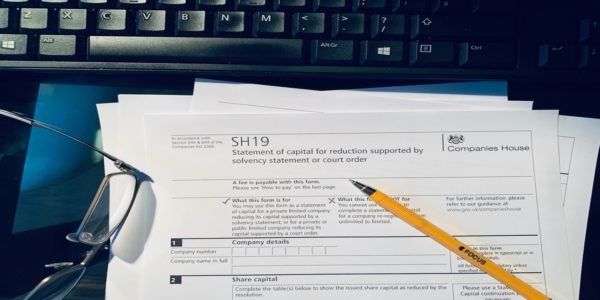Limited liability partnerships (LLPs) are incorporated at Companies House under the Limited Liability Partnership Act 2000. This means there are various LLP filing and reporting requirements to fulfil for both Companies House and HMRC, including preparing annual accounts and tax returns, filing confirmation statements, maintaining statutory registers, and reporting any changes to their registered details.
The designated members of a limited liability partnership are legally responsible for making sure that the business meets all of these statutory LLP filing and reporting obligations, which we outline below.
Key takeaways
- Designated members of LLPs are responsible for fulfilling essential filing and reporting obligations to HMRC and Companies House.
- LLPs must maintain statutory registers and report changes to ensure compliance with legal requirements and public records.
- Registering for VAT is mandatory for LLPs exceeding £90,000 in taxable turnover, offering potential benefits even below this threshold.
1. Deliver Self Assessment tax returns to HMRC
Each member of an LLP is required to register for Self Assessment to report and pay Income Tax and National Insurance on the personal earnings they receive through the partnership.
Designated members must also register the LLP itself for Self Assessment and deliver a partnership tax return to report the total income of the business, which includes the combined personal income of all members.
2. Send LLP accounts to Companies House
LLPs are required to prepare annual accounts every year and deliver them to Companies House. LLP accounts provide information on the financial performance and activities of the partnership during the previous financial year and should normally include:
- a profit and loss account
- a balance sheet
- notes to the account
- an auditors’ report (unless the LLP qualifies for audit exemption)
Designated members must ensure that LLP annual accounts are filed at Companies House no later than 9 months after the accounting reference date (ARD), which is the date that signifies the end of the LLP’s 12-month financial year.
3. File a confirmation statement at Companies House
Limited liability partnerships must deliver a confirmation statement to Companies House at least once every 12 months to confirm that the information registered at Companies House and displayed on public record is up to date.
The details you must check and confirm on the confirmation statement include:
- LLP name
- Registered office address
- Address where statutory registers are kept
- Details of all LLP members
- Which members are designated
- Details of all people with significant control (PSCs)
- Standard Industrial Classification (SIC) code(s)
Confirmation statements for an LLP can be filed online or delivered by post. It is quicker and easier to file online.
The deadline for delivering a confirmation statement is normally 14 days after:
- the anniversary of LLP incorporation, or
- the anniversary of the date on which the previous year’s confirmation statement was filed
The confirmation statement cannot be used to update any details about the LLP, apart from SIC codes. If you need to report any other changes, you must update the information separately using the appropriate Companies House forms for LLPs, before filing the confirmation statement.
4. Maintain LLP statutory registers
Limited liability partnerships are required to maintain certain statutory registers at their registered office or SAIL address, or on the public register at Companies House.
The statutory LLP registers that must be kept are the:
- register of LLP members
- register of LLP members’ usual residential addresses
- register of people with significant control (PSC register)
With the exception of the register of LLP members’ usual residential addresses, these registers must be made available for public inspection at whichever location they are kept.
5. Report changes to LLP details
It is commonplace for an LLP’s details to change throughout its existence. Certain changes must be reported to Companies House and updated on the public record, including changes to the:
- LLP name
- registered office address
- SAIL address
- address where statutory registers are kept
- LLP members’ details
- SIC codes
- Accounting Reference Date (ARD)
Most of these changes should be reported within 14 days. Designated LLP members must also ensure that, where relevant, changes are updated in the LLP’s statutory registers and confirmed on the next confirmation statement.
6. Send VAT returns
LLPs are legally required to register for VAT if their VAT-taxable turnover exceeds £90,000 in any 12-month period. VAT registration is also available on a voluntary basis for businesses with a turnover below the registration threshold, which can offer a range of benefits.
- Ordinary and designated LLP members – what’s the difference?
- The benefits of forming a limited liability partnership
If an LLP is registered for VAT, designated members must ensure that the partnership submits VAT returns, pays VAT to HMRC, and keeps accurate VAT records and a VAT account.
7. Operate PAYE
Whilst most LLP members are self-employed, a limited liability partnership may still need to register as an employer and operate PAYE if it employs other people, uses subcontractors under the Construction Industry Scheme, or if any LLP members are salaried rather than self-employed.
Please note that the information provided in this article is for general informational purposes only and does not constitute legal, tax, or professional advice. While our aim is that the content is accurate and up to date, it should not be relied upon as a substitute for tailored advice from qualified professionals. We strongly recommend that you seek independent legal and tax advice specific to your circumstances before acting on any information contained in this article. We accept no responsibility or liability for any loss or damage that may result from your reliance on the information provided in this article. Use of the information contained in this article is entirely at your own risk.












Join The Discussion